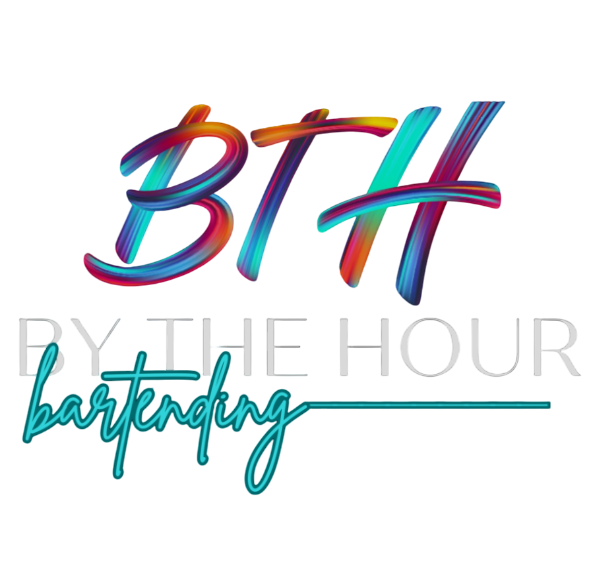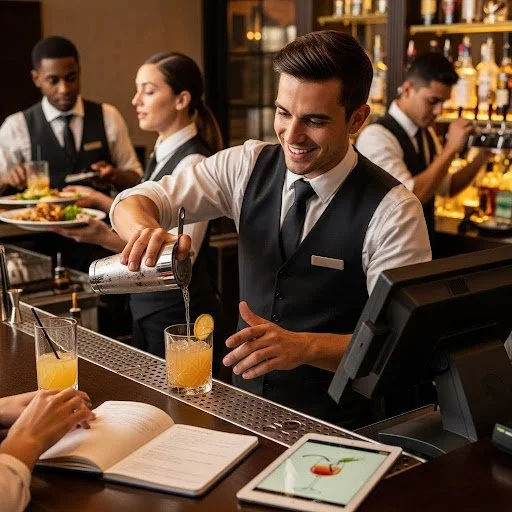Bartender Job Requirements: Skills & Certifications You Need
Breaking into bartending requires more than simply knowing the way to mix drinks. Success in hospitality relies on mastering hard and soft skills. It also requires meeting specific licensing rules, which can vary by location.
To become a bartender, you need a mix of customer service skills, drink-making expertise, and knowledge of local alcohol laws. Most states require certification such as ServSafe Alcohol or Smart Serve. Building experience through barback roles, attending bartending school, and networking can help you land better opportunities and advance your career..
What Are Core Bartender Responsibilities?
Crafting and Serving Drinks
Bartenders need to learn many cocktail recipes. They also must know how to mix drinks quickly during busy times.
This includes:
Knowledge of classic and signature craft cocktails
Proper use of bar tools and equipment
Understanding alcoholic beverages and their flavour profiles
Speed and accuracy in drink preparation
To create a great guest experience, customize drinks to their tastes. However, keep your signature drink menu consistent.
Managing Customer Interactions
Excellent customer support, paperwork, and the inspiration of a success bartending career. Your communication skills directly impact tips and repeat business.
Strong interpersonal skills let you sense customer moods, calm tense situations, and foster inviting spaces. Building rapport keeps customers returning to your local bar or during a wedding reception.
Ensuring Cleanliness and Safety
Health department regulations require bartenders to maintain spotless work environments. This responsibility extends beyond washing glasses to include:
Sanitizing bar surfaces and equipment
Proper food storage and handling
ID checks for responsible alcohol service
Monitoring customer alcohol consumption levels
Knowing how alcohol affects people helps avoid over-serving. It also ensures that we follow state laws about drinking on-site.
Inventory and Supply Management
Successful bar management requires tracking alcohol inventories, ordering supplies, and minimizing waste. Many businesses use POS system integration. It helps streamline inventory control and cut down on manual counting.
What Essential Skills Do Bartenders Need?
Communication Skills
Clear communication prevents order mistakes and enhances customer satisfaction. You'll interact with diverse clientele, requiring adaptability in your conversational approach.
Effective bartenders paintings with food servers and kitchen personnel.
This teamwork ensures smooth service during busy times.
Memory and Knowledge Retention
Memorizing extensive drink recipes, customer preferences, and bar procedures challenges even experienced professionals. Regular practice and systematic learning approaches help retain this information.
Many bartenders build personal reference systems. They also use mobile apps to access cocktail knowledge quickly during their shifts.
Multitasking and Time Management
Peak hours demand juggling multiple drink orders while processing payments through point-of-sale systems. Efficient bartenders broaden workflows that minimize wasted movement.
Effective shift scheduling is key for good staffing during busy times. This is especially important for bar management roles.
Problem-Solving Abilities
Unexpected situations arise frequently in hospitality jobs. Quick thinking stops service disruptions. It fixes equipment issues, addresses customer complaints, and adjusts recipes when supplies run low.
What Specialized Bartending Skills Matter Most?
Advanced Mixology Techniques
Beyond basic drink preparation, advanced bartenders study mixology courses to learn innovative techniques. This knowledge helps create unique cocktail experiences that differentiate your establishment.
Knowing how to mix flavours, add garnishes, and present dishes can increase your value and income.Cultural Competency
Modern cocktail culture draws inspiration from global traditions. Bartenders who know global drinking customs can better serve a broader range of customers.
This knowledge is beneficial in tourist spots or diverse cities. Being culturally sensitive improves the experience for guests.
Understanding of Alcohol Laws and Regulations
Compliance with liquor laws protects both employees and employers from legal liability. Key areas include:
Age verification and ID verification procedures
Hours of alcohol service as mandated by the local liquor control board
Liability insurance requirements for establishments
Regulations governing the alcohol serving course completion
What Certifications and Licenses Are Required?
Importance of Bartending Licenses
Most states require alcohol awareness course completion before serving alcoholic beverages professionally. These certifications educate accountable alcohol provider concepts and felony duties.
ServSafe Alcohol and Smart Serve are well-known programs. They meet licensing needs in many areas.
Variability of Certifications Across States
Licensing requirements vary a lot by state. Some states need yearly renewals, while others provide multi-year certifications.
Check your local liquor control board's website for specific rules. Not following these can lead to fines or job loss.
Additional Training Opportunities
Supplemental certifications enhance job prospects and demonstrate professional commitment:
Specialized bar management courses
Wine service certifications
Responsible beverage service training
Cash handling and POS system certifications
How Do Education and Experience Help?
Advantages of Attending Bartending School
Formal bartending education offers a structured place for students. They can practice techniques before they start working. Schools often maintain connections with local employers, facilitating job placement.
Many successful bartenders start with on-the-job training. They often do not need formal education, so attending school is optional.
Gaining Hands-On Experience
Entry-level positions like barback, server, or concession worker provide valuable hospitality industry exposure. These roles cover customer service basics and bar operations. You don't need to know much about mixology.
Private event staffing agencies provide flexible schedules. This helps staff gain experience in various venues and with different customers.
Networking and Building Industry Connections
Professional relationships significantly impact career advancement opportunities. Going to industry events, being part of bartender groups, and connecting with coworkers can increase job chances.
Social media lets bartenders show off their skills. They can share fun cocktails and network with industry contacts outside their local area.
Factors Influencing Pay
Bartender pay depends on location, venue type, experience, and local tipping habits. Upscale places and tourist spots often offer better earning chances. Factors that affect income include:
Base hourly wage versus tip-dependent compensation
Shift availability and scheduling flexibility
Additional responsibilities, like inventory management or training duties
Average Salary Ranges
Entry-level bartenders usually make minimum wage and tips. In contrast, skilled bartenders at high-end venues can earn much through gratuities.
Your location affects how much you can earn. Urban markets usually pay more than rural areas.
Tips for Maximising Earnings
Specialize in areas like:
Wine knowledge
Craft beer expertise
Signature cocktail creation
These skills boost customer appeal and increase tip potential.
Cross-train in related areas for extra income during slower periods:
Serving
Cash drawer management
Brand ambassador work
How Can You Advance Your Bartending Career?
Opportunities for Promotion
Experienced bartenders can move into supervisor positions, manage a bar, or become beverage directors in larger places. Candidates stand out for promotions if they have leadership skills, business knowledge, and a track record of success.
Transitioning to Related Roles
Bartending experience is valuable for many hospitality jobs. It can result in restaurant management, event planning, liquor sales, and beverage consulting jobs. Some bartenders use social media. They also share their mixology skills. They teach, write, or consult about cocktails. Today's tech, such as delivery apps and online orders, offers new chances for competent bartenders in hospitality. Are you ready to kick off your bartending journey?
Success needs commitment to learning, upholding professional standards, and fostering strong industry relationships.
Start by looking into local licensing rules. Then, think about entry-level jobs or bartending school to build fundamental skills. Bartending offers quick income and long-term career growth in the growing hospitality sector. With dedication and skill development, you can succeed in this field.
FAQs
1. What skills do bartenders need to have?
Bartenders need excellent customer service, mixology knowledge, multitasking ability, cash-handling skills, and strong communication.
2. Can I be hired as a bartender with no experience?
Yes, many bars hire entry-level bartenders, especially if you have great people skills and a willingness to learn.
3. Is bartending in high demand?
Yes, bartending is in steady demand, especially in cities, resorts, and event venues with high nightlife activity.
4. What are the five P’s of bartending?
The five P’s are Preparation, Professionalism, Personality, Presentation, and Passion—key to bartending success.
5. Do you need skills to be a bartender?
Yes—skills like drink preparation, customer service, and speed under pressure are essential for quality service.


